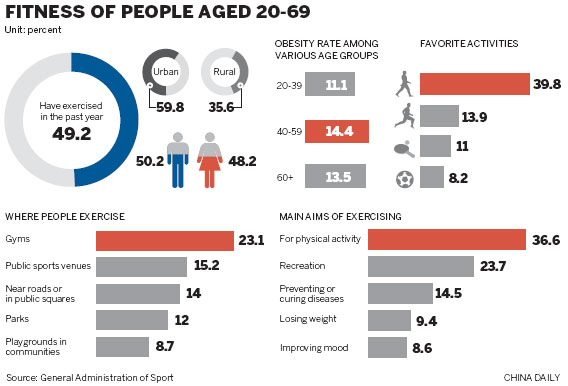Obesity rate on the increase
More Chinese people aged 20 to 39 are becoming overweight and their athletic ability is declining, according to a national survey released on Monday.
The survey of more than 43,000 adults found that more than 11 percent of people aged 20 to 39 are obese, an increase of 2 percentage points since the last survey in 2010.
The average weight gain of the group was 1.92 kilograms, higher than figures of the other two age groups (40-59 and 60 plus).
The General Administration of Sport survey of 10 provinces, autonomous regions and municipalities also found that 34.4 percent of Chinese between 20 and 69 are overweight.
Tian Ye, director of the China Institute of Sports Science, said the issue of weight and physical decline can be attributed partially to the lack of sports activities among young people.
"We are still analyzing the reasons, but it couldn't be more obvious that the lack of exercise played a negative role," Tian said.
According to the survey, those between 20 and 39 are the least active exercisers. Fifty-one percent of them don't exercise regularly, citing no time due to overloaded schedules.
The results also indicated that waist circumferences and hiplines have increased in all age groups, especially among young males and middle-aged females in urban areas.
Meanwhile, a decline has been seen among young adults in their ability to grip something, jump or maintain balance, indicating losses of strength and flexibility.
"Statistically, the fitness level of this group dropped in line with the decline of their sports involvement. It proved the importance of sports exercise for keeping fit and healthy," Tian said.
Giving up exercise for studies and work has been a nationwide trend among young people, and the government should do a better job of raising public awareness of mass fitness programs, experts said.
"The excuse of 'no time' means the public hasn't realized the importance of sports activities for a better life," said Xing Wenhua, a Beijing Sport University professor and mass fitness promoter.
"More education and promotion should be done to underscore that doing exercise is not only a way to keep fit but also releases pressure and negative emotions, which I believe is more important for young people."
Zhou Qinlu, a mass fitness researcher at Beijing Institute of Sports Science, suggested office workers take breaks during work for in-office exercise and choose healthier commuting tools like bicycles.
Apart from obesity issues, other results of the survey indicate that the general physical condition of Chinese people has maintained the level of 2010 without wide-ranging declines.
"Maintaining the same level means our national mass fitness program has done a decent job, because it's hard to stay there due to people's unhealthy lifestyle and growing pressure in the current society," said Jiang Chongmin, an executive with the National Fitness Monitoring and Researching Center.
"We didn't find major drops in this survey, which proved that our mass fitness efforts worked well."
Inspired by the success of 2008 Beijing Olympics, the General Administration of Sport set Aug 8, the opening date of the Games, as the annual National Fitness Day and has been promoting grassroots fitness programs since then.
According to the survey, the number of people aged 20 to 69 who do intense exercise three times a week has risen to 32.7 percent, 4.5 percentage points up compared with 2007.
That accompanied an increasing demand for more accessible public sports facilities.
More than 38 percent of those surveyed have been exercising at public sports venues including community and municipal sports facilities, an increase from 2007. Still, 9.6 percent of regular exercisers claimed the development of public sports facilities failed to meet people's demand.
Liu Guoyong, chief of the General Administration of Sport's mass sports department, said the authority will work on policies to urge more schools and State-run training bases to open facilities to the public.



















